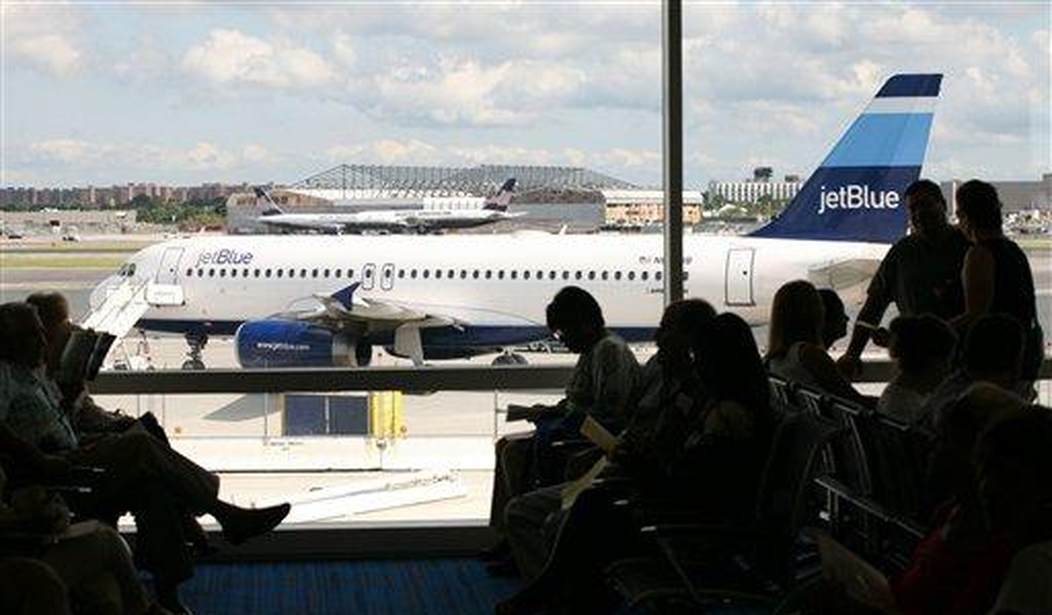If you want to see a classic case of how President Joe Biden's regulatory tendencies are strangling the U.S. economy and raising prices, look no further than the latest Justice Department efforts to kill an airline merger that is pro-consumer.
JetBlue has its sights on merging with a smaller and financially ailing airline, Spirit.
JetBlue's management believes the synergies between the two airlines will save over $300 million in costs. Spirit's shareholders (i.e., the airline's owners) have voted to approve the merger.
Spirit is like a cancer patient in chemotherapy. Industry analysts say that there's a 50-50 chance Spirit will go bankrupt without a suitor. A bankruptcy would crush Spirit shareholders, cause thousands of airline workers to lose their jobs, and enable other bigger airlines to swoop in and purchase its assets and its valuable airport landing rights at fire sale prices.
No one benefits from that scenario.
So, what's the holdup here? The Biden Justice Department is holding up the marriage on questionable antitrust grounds.
A strong case could be made that a successful merger between the two smaller airlines will enhance competition and lower prices by creating a larger discount airline. Today, about 70% of domestic flights are on four carriers -- American, Delta, Southwest and United. JetBlue controls just about 6% of the market (while Spirit's has shrunk to about 4%).
A merger like this is hardly going to allow JetBlue to monopolize the market or drive up prices. Regulators are concerned that in certain markets like Fort Lauderdale, Florida, where the two airlines directly compete, ticket prices may rise. This ignores that without the merger, Spirit may simply close.
Recommended
JetBlue is ranked as one of the best airlines for customer satisfaction. To compete more effectively with the big boys, it needs scale.
According to JetBlue's merger plans, the airline will leverage the infrastructure, employees and management of Spirit to schedule 1,700 more flights to 125 cities in 30 countries. This benefits -- it doesn't hurt -- consumers with more choices.
JetBlue's market niche has always been to compete in crowded markets by offering discount prices.
A Massachusetts Institute of Technology study has found that when JetBlue enters a market, it reduces airline fares by $32 each way on average.
Federal regulators in the Biden administration don't seem to understand that mergers and acquisitions are a routine and vital component of an innovative and entrepreneurial economy. Investors are willing to put millions of dollars at risk to launch startups in the hope that they will have an exit option at some point of being bought out by more sizable competitors.
How many people will invest in a startup airline in the future if the feds would prohibit the company from ever being sold? Or prohibit the company from growing by acquiring other assets as it grows?
The birth of the modern age in air travel began some 40 years ago when airline pricing and routing were almost entirely deregulated. Thanks to steadily falling airfares, airline travel, which was once the purview of the rich, has become affordable to middle- and even low-income travelers with fares as low as $100.
The irony of all of this is that if the JetBlue-Spirit marriage is prohibited or killed through interminable delays, the people who will be uncorking the champagne bottles will be the executives at American, Delta, Southwest and United.
In the name of helping consumers, the Biden administration may take the side of the biggest and most expensive airlines instead of the pro-competitive forces of a disruptive and lower-price carrier. How this would help consumers is anyone's guess.

























Join the conversation as a VIP Member